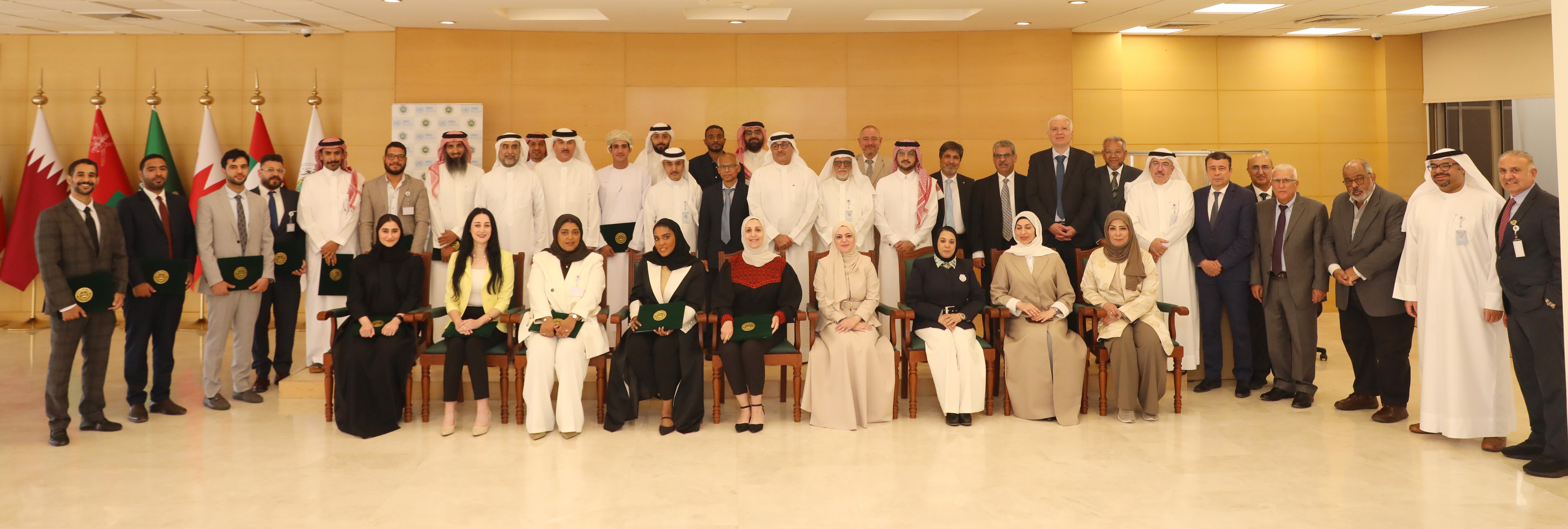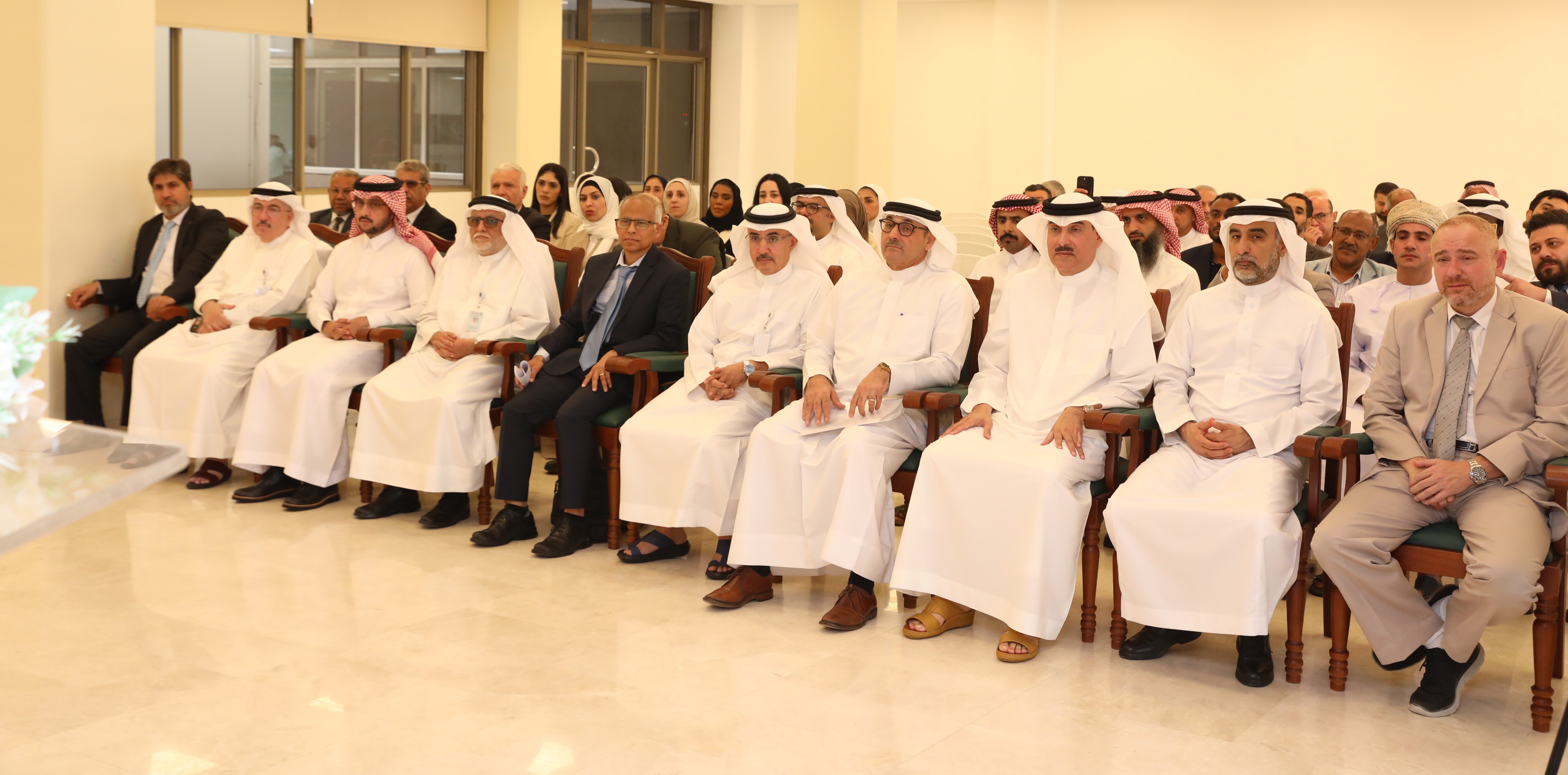
AGU Celebrates 20 Arab Graduates in the 10th Batch of the Integrated Water Resources Management Diploma Programme
Arabian Gulf University
11 Oct, 2025
His Excellency Dr Saad bin Saud Al Fuhaid, President of the Arabian Gulf University (AGU), underscored the vital importance of water for social and economic development and the role of Arab youth in confronting water challenges in the Arab world. He pointed out that the Arab region is one of the most drought-prone areas globally, with increasing water challenges due to population growth and economic expansion, which threaten water security and hinder the achievement of sustainable development goals.
This statement was made during AGU's celebration, represented by the UN Water Learning Centre for the Arab Region, for the graduation of the tenth batch of the Integrated Water Resources Management Diploma programme.
The programme is implemented in cooperation with the United Nations (UN) University Institute for Water, Environment and Health (UNU-INWEH) in Canada. The ceremony was attended by a number of officials, experts, and representatives of donor and supporting bodies, in addition to the graduates who are from various Arab countries.

During his speech, His Excellency Dr Al Fuhaid stressed that the conservation and sustainability of water are a shared responsibility among governments, institutions, and individuals. "This requires measures such as rationalising consumption, treating and reusing wastewater, protecting resources from pollution, investing in desalination projects, and enhancing regional and international cooperation." His Excellency stated.
He explained that the Integrated Water Resources Management Diploma programme aims to develop the participants' capacities in the technical, economic, social, and legal aspects of water, while changing the traditional perspective on water resources management in the region.
He further added: "Since its establishment in the early 1980s, the Arabian Gulf University has paid great attention to the issue of water, launching one of the first master's programmes in this field. This qualified it to be selected by the United Nations University to host the Regional Centre of the United Nations-Water Learning Centre (UN-WLC) for the Arab Region since 2007."
It’s worth citing that the number of graduates from the programme has reached 141 (male and female) from various Arab countries. They have received continuous support from the Arab Fund for Economic and Social Development, the Supreme Council for Environment in Bahrain, the Saudi Irrigation Organisation, the Electricity and Water Authority, the Kuwait Foundation for the Advancement of Sciences, and UNESCO, in addition to the backing from the governments of the Gulf Cooperation Council (GCC) countries.
For his part, Dr Mir Matin, Manager of Geospatial, Climate, and Infrastructure Analytics Programme at the UNU-INWEH in Canada, underlined the importance of this certificate, which he considered not just a document, but "a mandate for leadership in a complex and challenging world." He praised the ongoing cooperation between the UNU Institute and the AGU, which has spanned nearly two decades.
He highlighted the significance of the Water Learning Centre at the university, which is considered a major achievement in supporting integrated water resources management in the Arab region, especially in light of the severe environmental and water challenges it faces. He mentioned five key areas the United Nations is working on in the fields of water, environment, and health: governance and justice, energy and critical minerals, food security and biodiversity conservation, health and gender equality, as well as geographic and environmental analysis using modern technologies.
He noted that this year's graduation projects were distinguished by their diversity and innovation in applying the principles of integrated water resources management. "They addressed vital topics such as water safety plans in Sudan, the efficiency of wastewater treatment in Kuwait, economic assessments of artificial wetlands in Egypt, and the sustainable management of brine in Bahrain, among other projects that represent practical contributions to facing water challenges in the region. He called on the graduates to apply the knowledge they have gained in practical and community-based projects and to participate actively in the UNU-INWEH network to achieve a sustainable positive impact in the fields of water, environment, and health at the regional and global levels.
During the ceremony, Professor Waleed Zubari, Dean of the College of Education, Administrative and Technical Sciences, Professor of Water Resources at AGU, and Programme Coordinator, stated that the graduates today represent the programme's ambassadors and bearers of its vision to adopt an integrated approach to water resources management. He wished them success in facing the water challenges in the Arab world with innovative and sustainable methods.
He emphasised that this certificate is not an end, but the beginning of a new journey of giving and responsibility towards their communities and nations. He expressed his pride in the programme's outcomes and his confidence in the graduates' ability to contribute effectively to promoting sustainable water management in the Arab world and facing the increasing challenges in this vital sector.
He concluded his speech by saying: "Conserving water resources is a collective responsibility that requires the combined efforts of governments, international institutions, and individuals, through a package of solutions and measures such as rationalising consumption, reusing treated water, protecting resources from pollution, investing in desalination projects, and enhancing regional cooperation to exchange experiences and develop water technologies."
Furthermore, in a speech delivered on behalf of the Arab students, a number of graduates described this educational journey as exceptional. It provided them with a rich academic and professional experience, during which they engaged with important issues and topics in management, economics, policy, and the environment, such as wastewater reuse, good water governance, the efficiency of desalination plants, adapting to the impacts of climate change, and protecting natural habitats.
They expressed their deep gratitude to AGU, the UNU-INWEH, the professors, and the supporting bodies, including: the Arab Fund for Economic and Social Development, the UNESCO office in Cairo, the Kuwait Foundation for the Advancement of Sciences, the Supreme Council for Environment in Bahrain, and other institutions that believed in the importance of building the capacities of Arab youth.
They said the programme was a milestone in strengthening their scientific and practical abilities, moving them from traditional sectoral management to a holistic vision based on integration among the elements of the water system.
They added that the programme equipped them with analytical and planning skills that enable them to deal with water management challenges in their countries from an integrated perspective, reflecting the spirit of cooperation and shared responsibility upon which the Centre's mission is based.
They affirmed that the programme helped raise their readiness and capabilities as individuals to face the complex challenges posed by water resources management in the Arab region. It also contributed to strengthening the institutional capacities of the participating entities by providing them with trained competencies capable of introducing integrated management concepts into daily policies and practices, thereby multiplying its developmental and regional impact.
